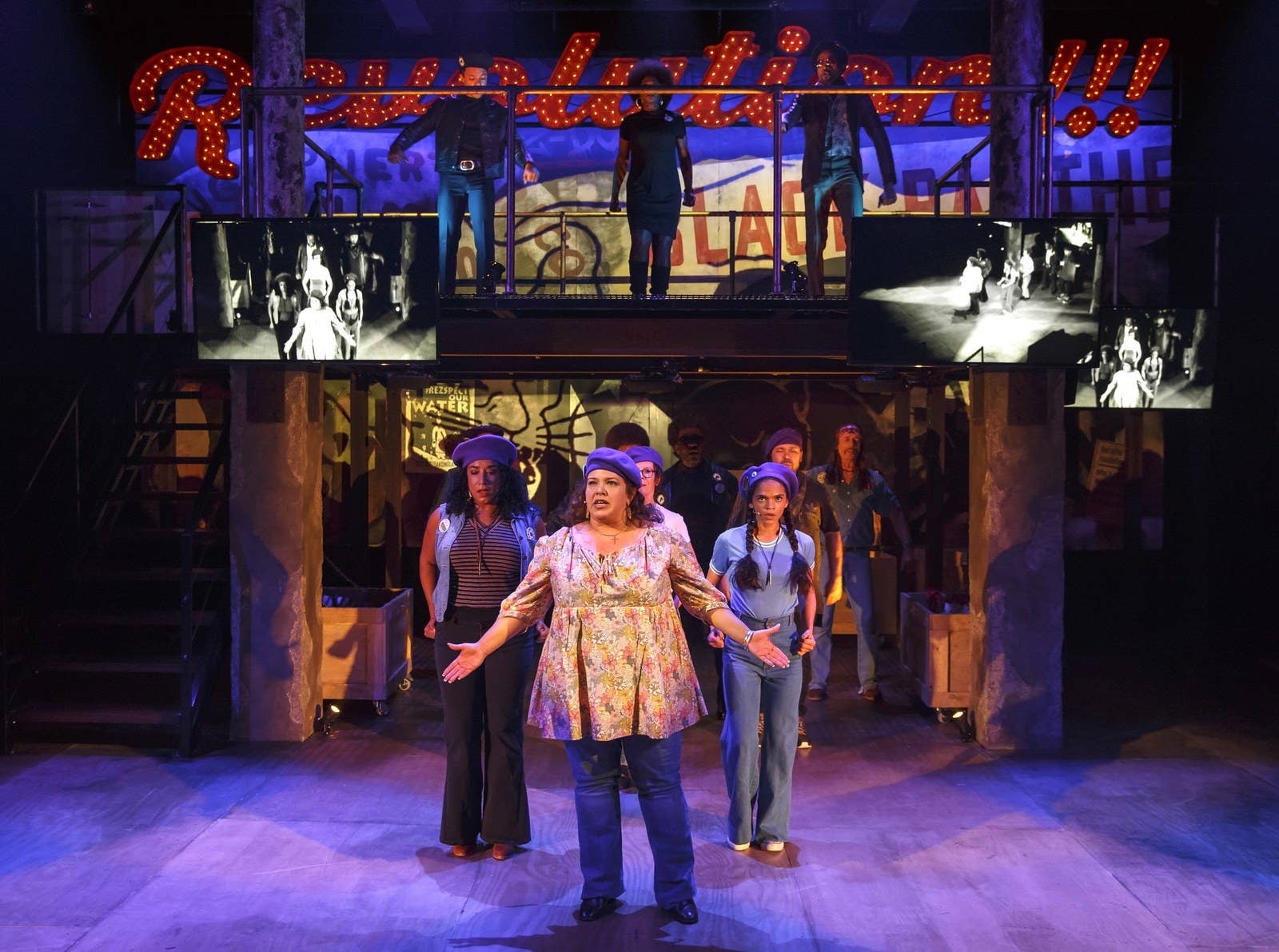
On Nov. 18, Hamilton star Brandon Victor Dixon delivered a curtain call statement to Vice President-elect Mike Pence from the stage of the Richard Rodgers Theatre: “We are the diverse America who are alarmed and anxious that your new administration will not protect us, our planet, our children, our parents, or defend us and uphold our inalienable rights, sir. But we truly hope that this show has inspired you to uphold our American values and to work on behalf of all of us.”
That same night, 40 blocks downtown at the Public Theater, the audience of Party People was hearing a more confrontational message. “Why do you think Donald Trump is the president?” Amira (Ramona Keller), a founding member of the Black Panther Party, roars in the second act. “This country has never wanted us to be free. After all these years, I live by this: no permanent friends, no permanent enemies, permanent principles.”
That line was written from a place of passion and horror the day after the Nov. 8 election. “It was relatively easy to go, ‘Oh, we need to say something,’” said Steven Sapp, a founding member of the theater company Universes who co-wrote and stars in Party People. “This is what we can say.”
If President-elect Donald Trump demanded an apology for the remarks at Hamilton, it’s hard to imagine how he’d respond to the incendiary admonition of Party People. But Amira’s words were not written for Trump’s ears: They are a call to arms to those who would resist him. The unequivocal conflation of Trump’s rise and white supremacy is not unique to Party People, but it’s a particularly potent message onstage, one that underscores the incomparable power of live theater.
“One of the things about being an artist is that you channel what you’re thinking and feeling.”
Party People combines music, video, and real-life interviews to explore the work of the Black Panther Party and the Young Lords Party. It’s a dynamic, multisensory theatrical experience, comprehensively researched and thrillingly unique. Actors recite the words of party leaders and transform them into song, reflecting a complicated but impressive legacy of advocacy.
Director Liesl Tommy, who developed the show with Universes, said that finding a way to incorporate Trump’s win into Party People was both necessary and a way of working through what she herself was feeling. “I don’t think I actually immediately processed what it meant beyond how it affected our storytelling,” she said. “One of the things about being an artist is that you channel what you’re thinking and feeling, and that’s what I did.”
The audience response to Party People and to the Trump mention in particular has been passionate and laudatory. “When we talk about suppression of activism in the play, that gets a lot of extremely vocal response, and I think that speaks to people’s fear going forward,” Tommy said. “1968 and 2016 suddenly seem closer in terms of given circumstances than people felt before the election.”
Party People’s themes of resistance and the power of activism were relevant before Trump’s win, but — for some more privileged members of the audience — distant. Much of that remove has since dissipated. “A lot of the white audiences have been sort of pushed in a way that I don’t think they thought they would be,” Sapp said. “You’re like, Oh my god, it’s in my backyard, and I have to start thinking about, ‘The people united will never be defeated!’”
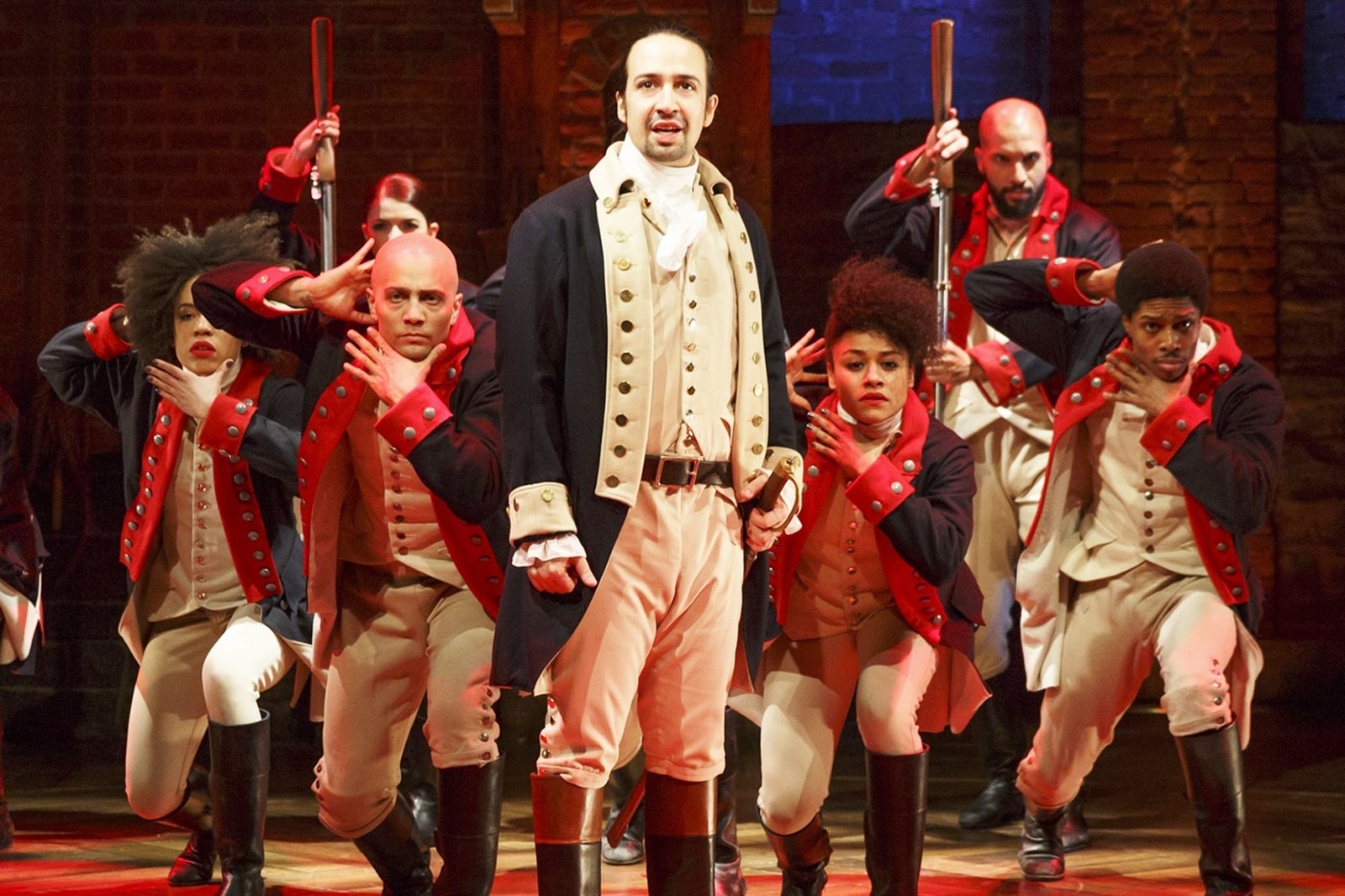
Playwright Warren Leight experienced a similarly intense audience reaction when he debuted his short play Union Square Incident in mid-November. Written during the early morning hours on Nov. 16 and performed that night, the play imagines a not-too-distant future with protesters being illegally detained. Leight’s play, which premiered as part of the annual 24 Hour Plays on Broadway, is unsubtle in its representation of a police state tied to a potentially repressive Trump regime, though the president-elect’s name is never uttered.
“It was like throwing the audience into a horrific dystopian amusement park ride,” Leight told BuzzFeed News in a phone interview. “It felt like they were almost holding their breath for 11 minutes. … I’ve never had something play quite that way in my life”
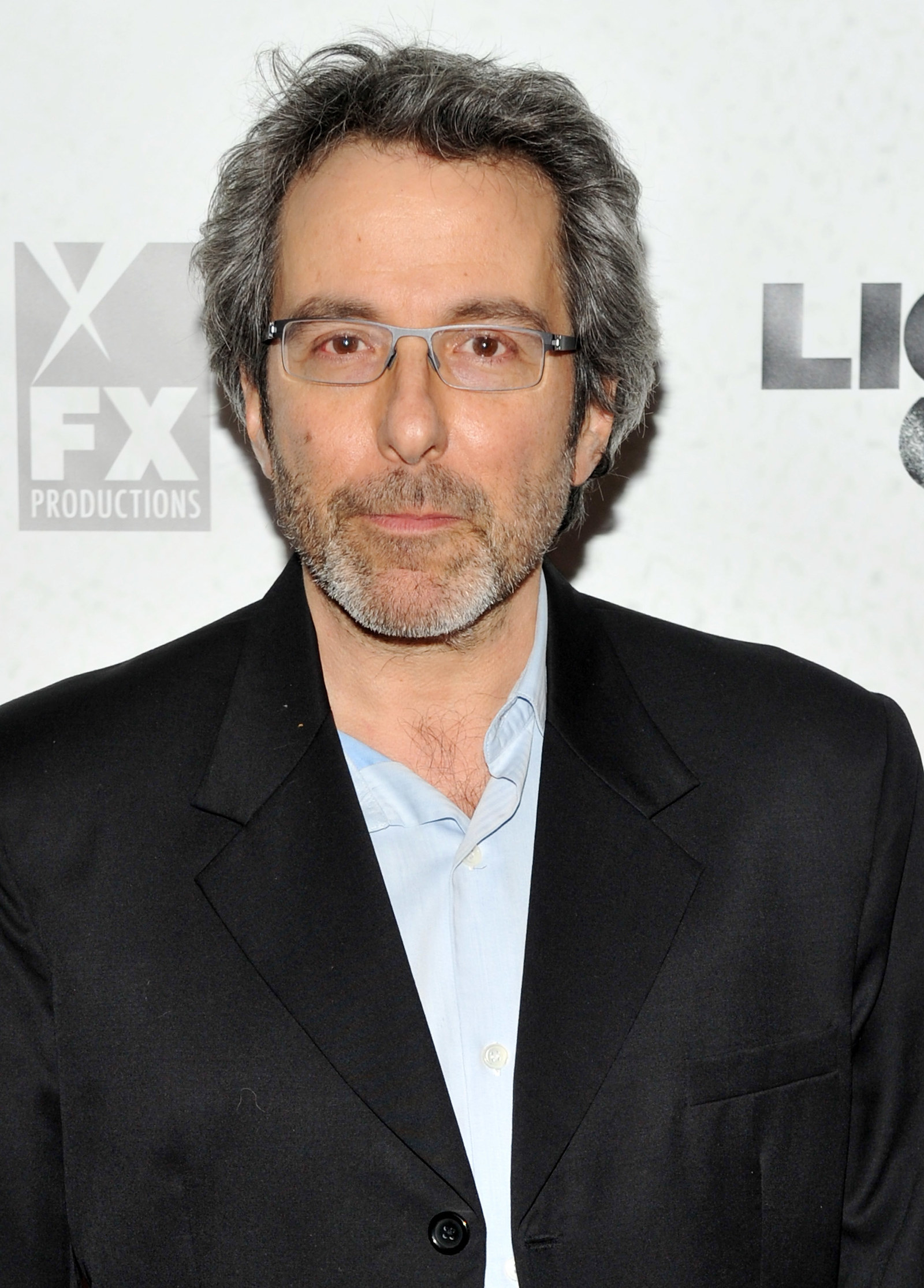
Leight wasn’t the only 24 Hour Plays playwright to address the election. The event, which pairs writers, directors, and actors to create new works, is timely by necessity, with writers conceiving their plays in the moment. While Leight noted that some of his fellow playwrights merely “glanced” at Trump’s victory, it informed their work, whether overtly or not.
“We were all, in some way or another, dealing with one of the stages of grief: bargaining, denial, anger,” Leight said, notably eschewing the fourth stage, acceptance. “It was really interesting to see six writers who have not all that much in common in terms of where their careers are and who they are, and everyone was unable to get out from under what we all perceived to be the cloud of this election.”
Leight acknowledged that his play is a bleak look at the country’s future and not our current reality, though he doesn’t believe anything he’s written is much of a stretch. “This is a dark view of what could happen, but it’s certainly within the realm of possibility,” Leight said.
His characters pointedly echo some of what’s already been said by those who believe fear of Trump’s presidency is disproportionate to what it will be. “I have to believe things aren’t going to be as bad as everyone says,” Michael, a middle-aged white male character, says.
“You want it to be a warning, ’cause a lot of people are still in denial.”
Even in the face of profound abuses of power, Michael cannot accept what is happening. Union Square Incident is Leight’s attempt to get audience members like Michael to pay attention. “You want it to be a warning, ’cause a lot of people are still, I think, in denial,” Leight said.
Following the Hamilton controversy, there’s been some debate over the role of politics onstage. In his tweets following the Hamilton incident, Trump wrote, “The Theater must always be a safe and special place.” Aside from being ironically reminiscent of the term “safe space” — which was originally used to signify a place for free expression regardless of race, gender identity, or orientation — the statement reflected a clear misunderstanding of what the medium really is. There’s a vast history of political theater, which has balanced entertainment with a clear perspective and an agenda of advocacy.
“From the days of Sophocles, the Greek theater, theater was a forum for debate, exchange of ideas,” actor George Takei told BuzzFeed News in a phone interview. “It is not a safe place. We go there to be excited, to be shocked, to be transported.”
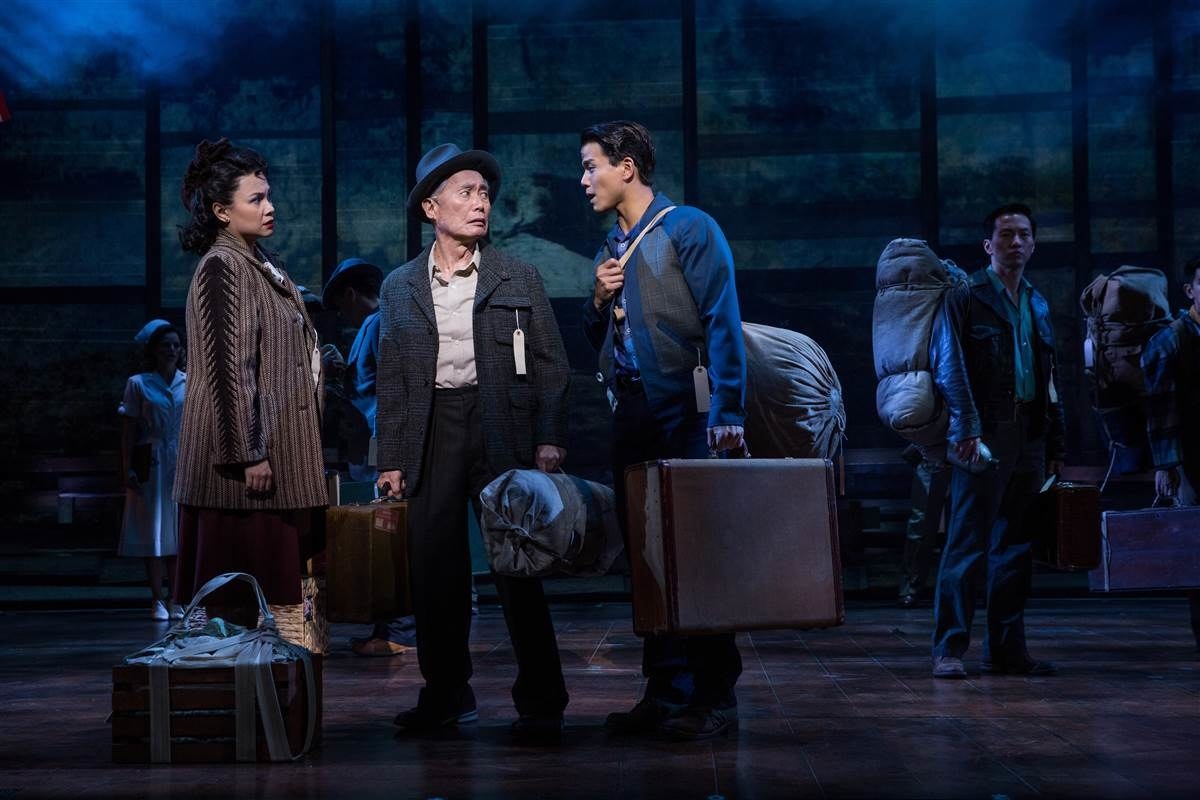
Takei is particularly invested in the role of theater to change minds: He is currently promoting his musical Allegiance’s one-night-only screening at movie theaters across the US and Canada. The musical, which ran on Broadway for four months before closing in February 2016, is based on Takei’s real-life experiences in the Japanese internment camps where Japanese-Americans were imprisoned during World War II.
“The internment chapter of American history is still little known and even less understood,” said Takei, who also starred in the musical. “[Allegiance] raises awareness of that chapter of our American history.”
In November, Carl Higbie, a spokesman for the pro-Trump Great America PAC, cited the Japanese internment camps as a precedent for a potential Muslim registry under a Trump presidency. Takei said he was “enraged” by the statement, and it renewed his drive to bring Allegiance to a larger audience.
“We will speak up and no, we will not be cowed by bullies with the power of government.”
The team behind the musical has invited all US elected officials to attend a screening free of charge on Dec. 13. “We’ve invited policymakers to enjoy themselves as well as be enlightened,” Takei said.
Whether consciously or not, theater has long been a tool for expressing dissent and changing minds. The Crucible, Arthur Miller’s 1953 allegory of McCarthyism, condemned the “witch hunt” of those who were unfairly stigmatized and denied work because of their supposed Communist leanings. In 1985, Larry Kramer’s play The Normal Heart — which, like Party People, ran at the Public Theater — gave a sympathetic and human dimension to the AIDS crisis, reaching those with limited knowledge of the scope and devastation of the disease.
Stephanie J. Block, who is currently starring in the musical Falsettos, which also touches on the AIDS epidemic, is adamant about the role of theater in expanding and potentially shifting the discussion.
“[Theater] sparks conversation, which I think is vitally important in this time,” Block told BuzzFeed News. “It becomes a communal experience. … It allows you to share all of that with the people who are sitting next to you [who] may have a completely different perspective than you have, and that allows for conversation.”
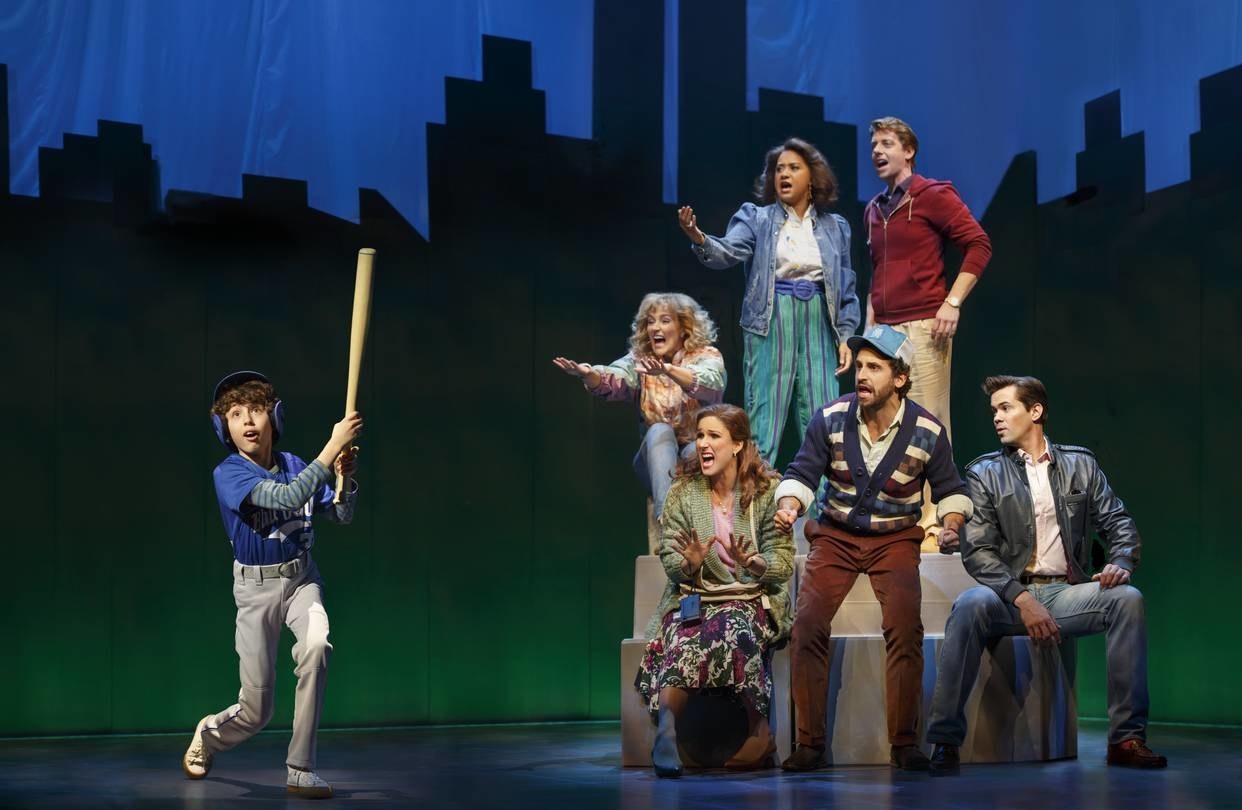
To some, Trump’s “safe space” tweet and further criticisms of Hamilton were merely a distraction. To others, they spoke to the president-elect’s perilous misunderstanding of freedom of speech. (For his part, Pence told Fox News, “When we arrived, we heard a few boos and we heard some cheers, and I nudged my kids and reminded them that’s what freedom sounds like.”)
Throughout his campaign and since being elected, Trump has spoken out against the “unfairness” of how he’s been written and spoken about by the media and the arts. That desire to quash dissent reads, to some, as the first step toward censorship.
“This is a guy who would be more comfortable if no one said something bad about him because he’s such a thin-skinned narcissist,” Leight said. “One way of looking at that [Hamilton tweet] is that it’s a warning shot. And if you cower at a warning shot, you’re not doing yourself any favors.”
Takei reiterated Leight’s point. “We’re citizens. We have the freedom of speech, and that’s what theater’s all about,” he said. “We will speak up and no, we will not be cowed by bullies with the power of government.”
All of the theater professionals who spoke with BuzzFeed News shared a common sentiment: The fight against censorship means continuing to speak out despite the consequences. “I’m scared about it,” Leight admitted, “but the only solution is to just scream louder.”
“Theater is supposed to excite and provoke, period.”
Theater as a whole will likely remain eclectic, with some works serving as pure apolitical escapism and others firmly identified as protest art. There’s room for both, of course. As Sapp said, “You’re gonna get Mary Poppins and you’re gonna get Party People.”
“There’s plenty of shows in the American theater that allow you to escape and don’t need you to go deep. That’s just not what I do,” Tommy said of Party People. “It’s always about the world we live in and how we can make it better and what we’ve done to make it worse, and it’s always gonna involve an exploration of humanity, what it means to be human, and how are we working together or working against each other.”
Not all theater will actively rail against the Trump administration, but much of it will at least reject the notion of theater as a “safe space.” “Theater is supposed to excite and provoke, period,” Sapp said. “And it’s supposed to be the voice of the people.”
How much of an effect the medium has on the country as a whole is difficult to predict. It is, to be fair, an art form that is not accessible to many. Broadway in particular is specific to New York City, and largely too expensive for a huge portion of the population. But theater can contribute to the conversation, and the vigorous debate the Hamilton speech inspired made that even clearer.
Block, along with many other theater artists, has been vocal on social media about her fears of a Trump presidency and the advocacy work that must be done to avert catastrophe. After the Hamilton incident, conservative critics returned to the oft-repeated refrain that actors are paid to act, not express their opinions, a suggestion that Block laughed off. “If you think that we're just vessels to spew out lines on a page, and we're not thinking members of society, then you're not a thinking person,” she said.
Regardless of how everyone chooses to take part, these artists insisted on the necessity and the power of staying involved.
“This is a really, really important moment and the writing is on the wall all around us, whether we decide to just carry on and hope for the best or whether we decide to try to participate and create dialogue and give people an opportunity to participate, because not everyone can do it on their own,” Tommy said. “You have to be the guide.”
